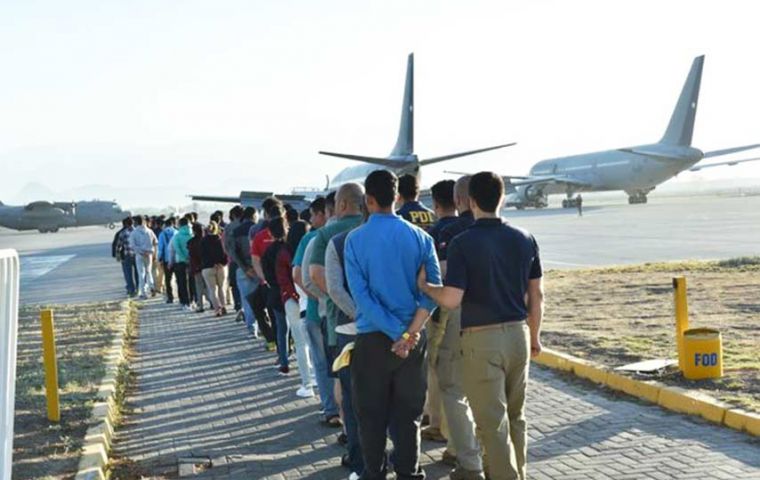MercoPress. South Atlantic News Agency
Foreign offenders expelled from Chile as deportation of irregular migrants set to resume
 Venezuelans who risk everything in pursuit of a better future in Chile will be once again expelled if their status is unclear
Venezuelans who risk everything in pursuit of a better future in Chile will be once again expelled if their status is unclear Chilean migration authorities Thursday expelled 49 migrants who were found guilty of human trafficking in addition to carrying weapons illegally, the Department of Migration and International Police of Tarapacá reported.
The measure was adopted as a commutation of sentence, Miguel Ángel Quezada, presidential delegate to Tarapacá explained. The 40 Bolivian and nine Peruvian were arrested in areas near the borders with their countries of origin.
“These foreigners availed themselves of a benefit granted to them by the Chilean State, protected by Law 20.603, Article 34, which is based on a substitute penalty that states that any foreign person who has a sentence of less than five years can agree to the benefit of commuting his sentence and avail himself for expulsion from the national territory,” Tarapacá Police Chief César Cortés pointed out.
The judicial expulsions came one day after Chile's federal government has announced it will resume expelling irregular migrants, most of them of Venezuelan origin.
Interior Minister Rodrigo Delgado announced the resumption of expulsion flights, a practice which has already been in practice between February and August this year, which resulted in the deportation so far of of 547 people. Last year, 1,365 irregular migrants were expelled.
The last deportation flight took off in August, after the United Nations voiced its concern. Chilean courts then halted these flights after admitting dozens of appeals grounded on the migrants' human rights.
“We have taken note of the recommendations, we have reviewed our processes, we are respectful of the rulings, but in this context during the next few weeks we are going to resume the expulsions,” Delgado said.
The announcement also came amid a rise in the entry of migrants through clandestine crossings on the border with Bolivia, in northern Chile, where 23,673 migrants have crossed in the first seven months of 2021, almost 7,000 more than in all of 2020.
”Chile is today an attractive migratory destination for many (due to) the health situation, vaccines (against COVID-19), the economic situation,” in addition to employmenty opportunities, Delgado further explained.
The Chilean town of Colchane, 3,650 meters ASL, has collapsed due to the arrival of thousands of undocumented immigrants, while at least 11 of them have died due to the harsh weather. In August alone, 331 foreigners, 260 of them Venezuelans, arrived at Colchane. The rest of them were Bolivian, Peruvian and Colombian, it was reported.
Venezuelan migrants, the largest foreign community in Chile with 455,000 registered people, top the list of clandestine entries from January to July, with 17,914, a figure higher than the 12,935 cases in 2020. They walk into Iquique from Colchane, even if it means risking deportation.
Many of them travel with little children, in defiance of the latest announcements from Chilean authorities. They seek basic help and shelter in Colchane, a rural town of just over 1,000 inhabitants in the highlands.
Clandestine migration has also resulted in the growth of illegal the transport business. A group of Venezuelan and Colombian migrants Thursday surrendered to the Chilean police and wait to be transferred from Colchane, on the border with Bolivia, to the city of Iquique. Upon entering Chile, they walk into a police station to “self-report,” as the authorities say. The names of those who surrender are included in an official registry which makes women and children eligible to be transferred 250 km to Iquique, a port city in northern Chile, more than 1,800 km north of Santiago.
For now, no measure has stopped the daily flow of migrants, mostly Venezuelans, although there are also many Colombians, especially from Buenaventura, Valle del Cauca, and some Dominicans.
Migrants sleeping on the street can also be seen in Antofagasta, a mining city 480 km south of Iquique, where the bus terminal is full of them trying to collect money wired to them from relatives in other parts of Chile so that they can travel on to Santiago.




Top Comments
Disclaimer & comment rulesCommenting for this story is now closed.
If you have a Facebook account, become a fan and comment on our Facebook Page!